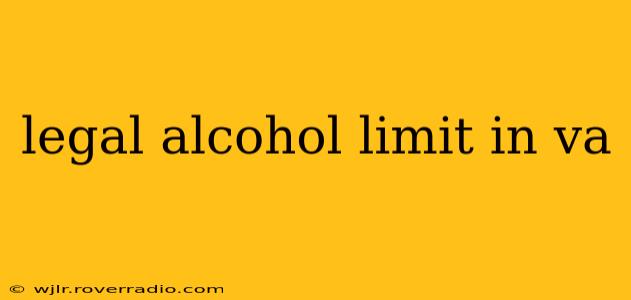Virginia, like all states, has specific laws regarding blood alcohol content (BAC) and driving. Understanding these limits is crucial for responsible driving and avoiding legal consequences. This guide provides a comprehensive overview of Virginia's legal alcohol limits, addressing common questions and concerns.
What is the legal BAC limit for driving in Virginia?
The legal Blood Alcohol Content (BAC) limit for driving in Virginia is 0.08%. This means that if your BAC is 0.08% or higher, you are legally considered intoxicated and driving under the influence (DUI). Driving with a BAC above this limit carries significant penalties, including fines, jail time, license suspension, and potential vehicle impoundment.
What are the penalties for driving under the influence (DUI) in Virginia?
Penalties for a DUI in Virginia are severe and increase with the number of offenses. First-time offenders can face fines, jail time (potentially up to one year), license suspension, and mandatory participation in alcohol safety programs. Repeat offenders face significantly harsher penalties, including longer jail sentences, higher fines, and potentially longer license revocations. The specific penalties will depend on several factors, including the driver's BAC, whether there were any accidents involved, and any prior DUI convictions.
What is the BAC limit for commercial drivers in Virginia?
Commercial drivers in Virginia face a much stricter BAC limit. The legal limit for commercial drivers is 0.04%. This significantly lower limit reflects the increased responsibility and potential risk associated with operating large vehicles. The penalties for commercial drivers exceeding this limit are also significantly more severe than for non-commercial drivers.
Is there a zero-tolerance policy for underage drinking and driving in Virginia?
Yes, Virginia has a zero-tolerance policy for underage drinking and driving. This means that even a small amount of alcohol in the system can result in significant legal consequences for drivers under the age of 21. The penalties for underage DUI can include license suspension, fines, and participation in alcohol education programs.
What constitutes "driving under the influence" in Virginia besides a high BAC?
It's important to understand that being legally intoxicated isn't the only way to be charged with DUI in Virginia. Officers can also make arrests based on observed impairment, even if the BAC is below the legal limit. This means that erratic driving, slurred speech, or other signs of intoxication can lead to a DUI arrest regardless of the BAC level. Therefore, avoiding alcohol entirely before driving is the safest approach.
Can I refuse a BAC test in Virginia?
While you have the right to refuse a BAC test, doing so will result in automatic license suspension. This is known as "implied consent." By driving on Virginia roads, you implicitly consent to BAC testing if suspected of DUI. Refusal carries severe penalties, making it a crucial decision to weigh carefully.
What are the potential long-term consequences of a DUI in Virginia?
A DUI conviction can have long-lasting effects. Beyond the immediate penalties, a DUI can impact employment opportunities, insurance rates, and even future travel opportunities. The record of a DUI conviction will remain on your record, impacting various aspects of your life for years to come.
How can I avoid a DUI in Virginia?
The best way to avoid a DUI is to plan ahead. If you plan to consume alcohol, arrange for a designated driver, use a ride-sharing service, or utilize public transportation. Never drive under the influence of alcohol. Remember, the consequences of a DUI far outweigh the convenience of driving yourself.
This information is for educational purposes only and does not constitute legal advice. For specific legal advice, consult with a qualified attorney in Virginia.
